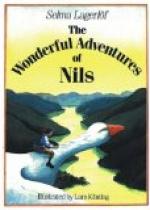“No, of course, I won’t,” the boy assured him.
“You may go where you like if only you are back here by sundown,” said the eagle, as he flew off.
The boy sat on a stone gazing across the bare, rocky ground and the great forests round about.
He felt rather lonely. But soon he heard singing in the forest below, and saw something bright moving amongst the trees. Presently he saw a blue and yellow banner, and he knew by the songs and the merry chatter that it was being borne at the head of a procession. On it came, up the winding path; he wondered where it and those who followed it were going. He couldn’t believe that anybody would come up to such an ugly, desolate waste as the place where he sat. But the banner was nearing the forest border, and behind it marched many happy people for whom it had led the way. Suddenly there was life and movement all over the mountain plain; after that there was so much for the boy to see that he didn’t have a dull moment.
FOREST DAY
On the mountain’s broad back, where Gorgo left Thumbietot, there had been a forest fire ten years before. Since that time the charred trees had been felled and removed, and the great fire-swept area had begun to deck itself with green along the edges, where it skirted the healthy forest. However, the larger part of the top was still barren and appallingly desolate. Charred stumps, standing sentinel-like between the rock ledges, bore witness that once there had been a fine forest here; but no fresh roots sprang from the ground.
One day in the early summer all the children in the parish had assembled in front of the schoolhouse near the fire-swept mountain. Each child carried either a spade or a hoe on its shoulder, and a basket of food in its hand. As soon as all were assembled, they marched in a long procession toward the forest. The banner came first, with the teachers on either side of it; then followed a couple of foresters and a wagon load of pine shrubs and spruce seeds; then the children.
The procession did not pause in any of the birch groves near the settlements, but marched on deep into the forest. As it moved along, the foxes stuck their heads out of the lairs in astonishment, and wondered what kind of backwoods people these were. As they marched past old coal pits where charcoal kilns were fired every autumn, the cross-beaks twisted their hooked bills, and asked one another what kind of coalers these might be who were now thronging the forest.
Finally, the procession reached the big, burnt mountain plain. The rocks had been stripped of the fine twin-flower creepers that once covered them; they had been robbed of the pretty silver moss and the attractive reindeer moss. Around the dark water gathered in clefts and hollows there was now no wood-sorrel. The little patches of soil in crevices and between stones were without ferns, without star-flowers, without all the green and red and light and soft and soothing things which usually clothe the forest ground.




